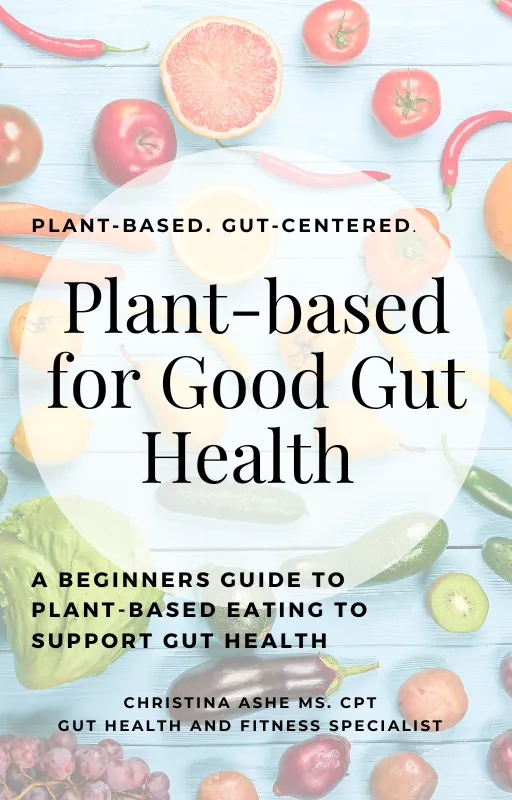
What you put in your body matters.
Learn from a nutrition expert
15 plant-centered recipes
Promote a healthy gut environment

Topics Covered In The Book
-Reduce consumption of highly processed foods
-Reduce consumption of added sugar
-Consume high nutrient-dense foods; veggies, fruit, fish, whole grains, nuts, and legumes
-Eat REAL food (2 meals and 1 snack)
-Consume low, but adequate fiber to improve digestive health
-Make easy to follow recipes full of various plant foods
-Reduce inflammation
-Provides gut support Increase overall energy

For the Love of Plants!
Dive into the world of plant-centered nutrition with my comprehensive guide, designed to make gut health delicious and accessible. Inside, you'll find 15 mouthwatering recipes, each crafted with gut-friendly ingredients that nourish and support your digestive system.
Whether you're new to plant-based eating or a seasoned pro, this ebook is your roadmap to vibrant well-being. I have curated a collection of easy-to-follow recipes that celebrate the goodness of plants, from hearty salads to comforting soups and satisfying mains.
Learn how to create dishes that not only tantalize your taste buds but also promote a healthy gut environment. My expert tips and insights make it easy to understand the importance of fiber, probiotics, and other gut-loving nutrients found in plant-based foods.
GET INSTANT ACCESS

About The Author
Christina Ashe, MS, CPT
Christina, a Wellness Coach, specializes in gut health and longevity. She takes her extensive dietetic training combined with the research background she received from her Master's in Nutrition and Dietetics to provide evidence-based information that empowers her community to improve their health one step at a time. She places significant energy on educating and coaching about the healing power of food using a holistic approach.
It's about empowerment for me. once you are empowered about your health you will have the skills to take control of your health and well-being.

Have Questions? Look Here
There are general questions that individuals might have, but it's important to consult with a healthcare professional or registered dietitian for personalized advice based on their specific health conditions and dietary needs.
Can these foods be included in different types of diets, such as vegetarian, vegan, or gluten-free diets?
Yes, these foods can be incorporated with any eating style. It's worth noting that while these foods can be included in various diets, it's essential to ensure a well-rounded and balanced intake of nutrients. For example, individuals following a vegan or vegetarian diet should pay attention to sources of vitamin B12, iron, calcium, and omega-3 fatty acids, which are commonly found in animal-based foods. They may need to consider fortified foods or supplements to meet their nutritional needs.
Are there any potential risks or side effects associated with consuming these foods ?
In general, the longevity foods mentioned earlier are considered safe and beneficial for most people when consumed as part of a balanced diet. However, it's important to be aware of potential risks or side effects that could arise, although they are generally rare or minimal. There are some things to consider:
Allergies: Some longevity foods, such as nuts, seeds, berries, or seafood, can cause allergic reactions in susceptible individuals. If you have known allergies, it's important to avoid the specific foods that trigger your allergic response.
Interactions with medications: Certain longevity foods, like grapefruit or green tea, can interact with specific medications. For example, grapefruit can interfere with the metabolism of certain drugs, leading to higher or lower levels of the medication in the body. If you are taking medications, consult your healthcare provider to ensure there are no potential interactions with the foods you plan to consume.
Individual tolerances: While generally well-tolerated, some people may have specific sensitivities or intolerances to certain longevity foods. For instance, individuals with irritable bowel syndrome (IBS) might experience digestive discomfort when consuming certain high-fiber foods like legumes or whole grains.
Overconsumption: Even healthy foods should be consumed in moderation. Some longevity foods, such as nuts or fatty fish, are nutritious but high in calories. Excessive intake of these foods may lead to weight gain or other health issues. It's important to consider portion sizes and balance your overall calorie intake.
Pesticide residues: Non-organic versions of longevity foods may contain pesticide residues. While the overall health benefits of consuming these foods generally outweigh the potential risks of pesticide exposure, individuals may choose to purchase organic versions or wash fruits and vegetables thoroughly to reduce pesticide residues.
Can these foods interact with any medications or medical conditions I have?
Yes, certain longevity foods may interact with medications or medical conditions. It's important to consider potential interactions and consult with a healthcare professional or pharmacist if you have specific medications or medical conditions. Here are a few examples:
Blood thinners: Some longevity foods, such as leafy greens and certain berries, contain vitamin K, which can interfere with the effectiveness of blood-thinning medications like warfarin. It's important to maintain a consistent intake of vitamin K-rich foods and work with your healthcare provider to adjust medication dosages accordingly.
Thyroid conditions: Certain cruciferous vegetables, including kale, broccoli, and Brussels sprouts, contain compounds known as goitrogens, which can interfere with thyroid function. While the impact is generally minimal when consumed in normal amounts, individuals with thyroid conditions may want to monitor their intake or cook these vegetables, as cooking can reduce goitrogen content.
Gastrointestinal conditions: Some longevity foods, such as high-fiber foods like legumes or whole grains, may exacerbate symptoms in individuals with certain gastrointestinal conditions like irritable bowel syndrome (IBS) or inflammatory bowel disease (IBD). It's important to consider individual tolerances and modify the intake of these foods accordingly.
Allergies or sensitivities: Individuals with known allergies or sensitivities to specific foods, such as nuts, seafood, or berries, should avoid or limit consumption of those particular longevity foods to prevent allergic reactions or adverse effects.
Are there any age or gender considerations when consuming these foods?
When it comes to consuming longevity foods, there are no specific age or gender restrictions. However, certain considerations can be helpful for different age groups or genders. Here are a few points to consider:
Age considerations:Children and adolescents: It's important to introduce a variety of longevity foods to children early on to promote healthy eating habits. However, certain foods may need to be prepared or modified for younger children to ensure age-appropriate textures and sizes.
Older adults: As individuals age, their nutritional needs may change. Older adults may require higher calcium and vitamin D intake for bone health, and adequate protein intake to prevent muscle loss. Longevity foods like leafy greens, dairy or dairy alternatives, and lean sources of protein can be beneficial.
Can these foods be incorporated into a balanced diet with other food groups to ensure overall nutrition?
Absolutely! Longevity foods can and should be incorporated into a balanced diet that includes foods from all food groups. It's important to have a diverse and well-rounded intake of nutrients for overall nutrition.

Privacy Policy
Terms and Conditions
© Copyright 2023 www.gutnourished.co-All rights reserved